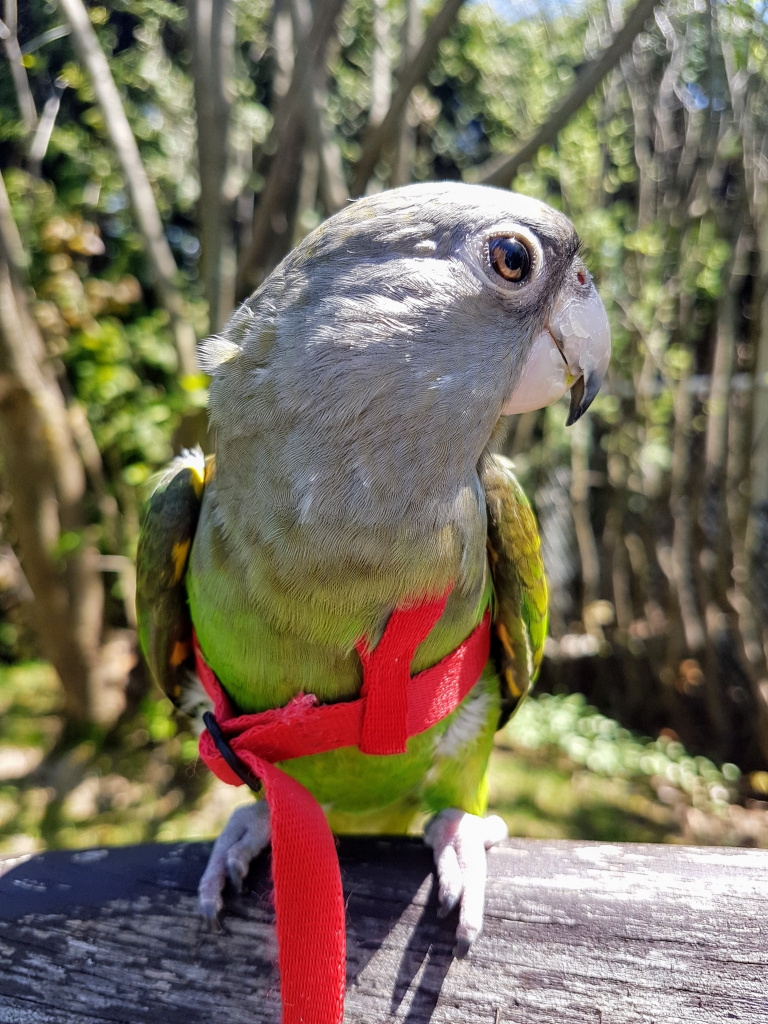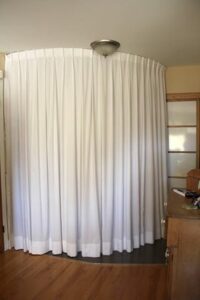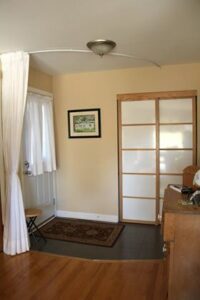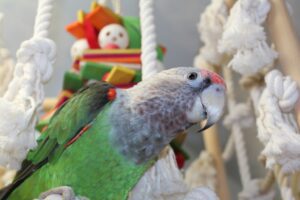
Having a parrot at home changes your life! Before wondering what kind of parrot you would like to adopt, ask yourself if you are cut out to have a parrot. Here is the first part which provides an overview of the elements to consider when you want to adopt a parrot… and make him happy for a long time! If you believe that a cage, water, grain, and brightly colored toys are the keys to a pet bird's happiness, you will benefit from reading this. Let's start with what a house (or apartment) where a winged companion lives should look like.
The perfect place
Firstly, his cage is not a decorative element. It is his living space and it is essential because it is the place where your bird rests and feels safe. You have to choose it carefully; the size, spacing between the bars, and shape must be adapted to the chosen species. A rusty or repainted cage can cause poisoning. So if you choose a used cage, or one made by hand, make sure that the materials are in good condition and that they are not dangerous for the health of your new resident. When you install it, remember to put the cage out of reach of other animals and young children to prevent noses or little fingers from being pinched unnecessarily and reduce everyone's stress.
Choosing the right place where you will install your bird's cage will have a direct influence on how you will live together. Maintaining the cage will become a daily activity and installing it in an accessible and easy to clean location is important to simplify this task. Droppings, food, water, feathers, wood chips and shredded pieces of paper are more difficult to clean from a carpet than from a ceramic floor, for example.
When he perceives a threat, the parrot's first reflex is to fly away and find an observation post in order to analyze the situation. His eyesight is also very developed in order to react to any unusual movement. A caged bird that cannot obey this instinct and feels at the mercy of the action around him can go so far as to suffer from anxiety. It is for this reason that the cage must be placed in a strategic location. You should choose a fairly quiet room, where he can still participate in family life. A cage placed in the center of a room represents 360 degrees of space to monitor; it is better to place it with its back to a wall. A cage near a window can also be a source of nervousness because cars, wind, birds and other movements from outside are very difficult for him to predict and interpret.


Secure the premises
Once your parrot is at ease in your home, there is a good chance that he will turn into an explorer, which often happens through its beak. Many parrots love to shred paper and they may fall in love with a well-stocked bookshelf. Others will prefer to dabble in door frames or develop a horticultural instinct and want to take care of your beautiful houseplants and their pots. In order to avoid unfortunate accidents and injuries, it is necessary to obtain information to identify the sources of potential dangers. Rearrangement may be necessary to protect objects that could be damaged by a motivated beak. Although this is part of living with a feathered roommate, be aware that certain substances in paints, dyes, plant leaves and other items can be toxic and dangerous to birds. The best way to prevent your new friend from developing these bad habits is to supervise him when he leaves his cage and provide him with a place where he will find healthy objects to chew and shred to occupy his beak.
In the house, certain elements that are harmful to us are even more harmful to our birds. In fact, the respiratory system of birds is one of the most efficient on earth. It is designed to maintain a very high level of oxygen in the blood since flying consumes a lot of it. The problem is that when pollutants are present, this system is very efficient at absorbing and transporting them very quickly through their body. Smoke from cigarettes, fireplaces, solvents and even cooking fumes, such as from improper use of Teflon pans, can affect the health of parrots to the point of killing them without warning. You have to think about this when you are preparing to do renovation work or changes to the house.
If you have other animals, even if they are very gentle and get along well with your bird, they can be dangerous for your bird. Invisible, but potentially fatal, the danger comes from the bacteria that everyone carries naturally. Therefore, birds should not be allowed to drink the dog's water, play in the cat's food or go swimming in the aquarium water. He could come into contact with bacteria against which his immune system cannot defend. This goes for our human bacterial flora; It is not advisable to share the same mouthful of food with your parrot.
Another element to secure: doors and windows. Far too many birds accidentally end up outside because a door or window has been forgotten. Although they are sometimes found, it is a distressing experience for both the bird and his family. Plus, it can end in tragedy, especially if he finds himself outside in the middle of winter. To prevent these situations, make sure he does not fly freely into a room where a door can open directly to the outside. Close the vestibule doors, consider curtains to separate the rooms and do not leave him alone on a window sill with a screen net as the only barrier. Some people post signs at the front door to remind visitors to wait a little while the birds are placed in safety.
These few tips can help you prepare your environment for the arrival of a parrot. Obviously, depending on the species and his character, you will have to find strategies that work for you. Apart from certain species that are noisier, or require more space, parrots can adapt very well to an apartment, provided that their needs are respected. You will see, you will not regret having taken the time to prepare yourself; the relationship you develop will be easier and it will make you forget all these sacrifices!

The house is ready; you have found the most strategic place and the best layout so that he feels safe and thrives in your home. And now? Are you equipped to meet their basic needs? To help you plan better, here are the 5 most important things he will need throughout his life and for which you must prepare:
Depending on where your bird comes from, he may be used to eating a mixture of seeds and refuse everything else. Your first job will therefore be to make him accept diversity and make a gradual transition towards food that will meet his nutritional needs. Seed mixtures, which are very common, do not ensure good long-term health. Very often, birds sort them to eat only what they prefer, often the fattest seeds, like those of the sunflower. These bad habits often lead to health problems, just like humans; obesity, liver problems, heart problems, etc. Although each species has its particularities, the diet of parrots in captivity should consist of 50% to 80% of suitable pellets depending on the species and be supplemented with vegetables, fruits, grains, nuts and other healthy foods found also on our plates. Colorful vegetables should be favored because they are full of vitamins and have less sugar than fruits. Then all that's missing is fresh water. Place a bowl of water in the cage, where it will be least soiled. You will need to change the water at least twice a day and sometimes more, because some birds love to make soup in it and you need to prevent bacteria from developing there.
You will need a blanket to cover the cage at night. Your bird will need 12 hours of rest, without light and in a quiet place. This rest is essential to one’s health. If the room where he lives is too busy during the evening, you can move the cage to a quieter room for the night and put it back in the morning.
In the first few days, you may spend a lot of time with your new roommate, which is normal, but remember that you have a life to live. You must resist the temptation to become his favorite activity, because he must be able to function when you are away. If you get him used to being on your shoulder all day long and sharing all your activities, he will be very happy. On the other hand, when you start to find him invasive and want him to spend some time in his cage, he may not agree and will express this to you very clearly. To avoid this trap, you must find something to occupy him when he is in his cage. From his first days with you, introduce him to foraging. Indeed, in their natural environment, birds spend the majority of their time looking for food; they forage in branches and on the ground to find food. In their cage, with abundant food, they do not need to forage; they become lazy, get bored easily and it is often in these cases that changes in behavior can occur that will complicate your relationship. To begin training, find the treat your bird loves most in the world and hide pieces of it in his cage. Start by rolling them up with paper, if he finds them, complicate the search by putting several layers of paper, cardboard, or hide them in his toys. This activity will relieve his boredom, stimulate him and he will be calmer without you.
You will have to let him get used to his environment and take the pulse of the house. The sounds, the comings and goings, the scenery, everything is new to him and he will undoubtedly be fearful at first. Give him time in his cage so that he feels at home and can watch the action while feeling safe. Then, quietly, have him explore his environment and meet the members of his new family. This adaptation period may take several weeks, but take your time and you will see him gain confidence and you will be able to discover his personality. Keep in mind that birds do not perceive things the way we do and are sometimes sensitive to changes as small as installing a Christmas tree in the living room, so will need a moment to adapt.
If your parrot is healthy, he should be seen by a veterinarian once a year. So, schedule a first appointment after a few weeks to begin follow-up. A routine exam is not very expensive and gives you an opportunity to ask questions about things that worry you. Choose a veterinarian specializing in avian health. He will be able to advise you on diet, the dangers of deficiencies, the small details to pay particular attention to, even regarding his behavior. Their general health will be noted and follow-up will allow health problems to be detected earlier and treated more effectively.
After reading this, you still have work to do; that of informing you. This list is just the tip of the iceberg, as it applies to birds that are already healthy. We encourage you to start by knowing the different species in order to choose the one that will best suit your lifestyle. In addition, you will find very interesting books on basic care and other subjects that we have not covered in this article. Explore the different topics in the pet parrot discussion forums; enthusiasts have a lot of experiences to share. Search your area for specialized services for pet birds. The best way to welcome a parrot into your home is to have realistic expectations and the only way to achieve this is to be well informed. Then, you will be able to fully enjoy the experience of living with a brilliant, surprising being who will bring life to your home.